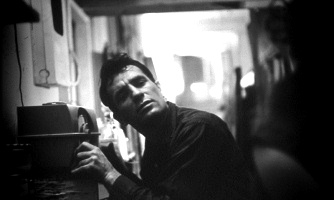Le grand art de la réalisation de la BBC pour The Gesualdo Legacy dans The Early Music Show du 6 novembre dernier*.
Ça commence avec du Mozart (qui rime d'abord avec "bizarre", vu le thème), musique qui accompagne un texte d'Aldous Huxley sur Gesulado dont on entend bientôt un madrigal.
Une émission de haute tenue où s'entrecroisent pièces du compositeur**, propos de l'érudit américain Glenn Watkins et musiques des émules de Gesualdo, tout cela mis en forme par la productrice Fiona Talkington. Une heure dense, sensible, instructive qui n'est pas sans rappeler les émissions passées de Renaud Machart (Chambre d'échos et Paysages composés) et de Dominique Jameux (Histoires de musique) sur France Musique.
L'art de la composition radiophonique à son sommet.
* Fiona Talkington looks at the legacy of Carlo Gesualdo and the fascination that his life and music held for certain 20th century cultural figures, including composers Igor Stravinsky and Peter Maxwell Davies, novelist Aldous Huxley and film maker Werner Herzog. The programme includes an interview with Professor Glenn Watkins, who has written extensively about Gesualdo's life, work and influence.
**Pour aller plus loin : Gesualdo: Glorious music and grisly murder BBC Counterpoint Classical music - History. Extrait : [...] I will never forget the first time I experienced Gesualdo – the memory still sends goosebumps rippling over my flesh. It was late at night (suitably), around ten years ago, and I was hanging out with a friend with dizzyingly wide musical tastes. We’d been listening to a succession of vintage vinyl jazz records, and then, out of nowhere, he stuck on a CD. The sound that came out of the speakers was like nothing I’d never heard. Eerie, creepy harmonies whose nerve endings seemed disturbingly close to the surface, yet which were wrenching in their beauty. Pure vocal lines whose crystalline clarity was a form of sonic rapture, yet were clearly devilishly difficult to sing. What was up with this insane music? And what on earth had the composer been on when they wrote it?
“When do you think this was written?” my friend asked.
“Er…? Last week?”
“1611”, he replied.
I nearly fell off my chair.
Ça commence avec du Mozart (qui rime d'abord avec "bizarre", vu le thème), musique qui accompagne un texte d'Aldous Huxley sur Gesulado dont on entend bientôt un madrigal.
Une émission de haute tenue où s'entrecroisent pièces du compositeur**, propos de l'érudit américain Glenn Watkins et musiques des émules de Gesualdo, tout cela mis en forme par la productrice Fiona Talkington. Une heure dense, sensible, instructive qui n'est pas sans rappeler les émissions passées de Renaud Machart (Chambre d'échos et Paysages composés) et de Dominique Jameux (Histoires de musique) sur France Musique.
L'art de la composition radiophonique à son sommet.
* Fiona Talkington looks at the legacy of Carlo Gesualdo and the fascination that his life and music held for certain 20th century cultural figures, including composers Igor Stravinsky and Peter Maxwell Davies, novelist Aldous Huxley and film maker Werner Herzog. The programme includes an interview with Professor Glenn Watkins, who has written extensively about Gesualdo's life, work and influence.
**Pour aller plus loin : Gesualdo: Glorious music and grisly murder BBC Counterpoint Classical music - History. Extrait : [...] I will never forget the first time I experienced Gesualdo – the memory still sends goosebumps rippling over my flesh. It was late at night (suitably), around ten years ago, and I was hanging out with a friend with dizzyingly wide musical tastes. We’d been listening to a succession of vintage vinyl jazz records, and then, out of nowhere, he stuck on a CD. The sound that came out of the speakers was like nothing I’d never heard. Eerie, creepy harmonies whose nerve endings seemed disturbingly close to the surface, yet which were wrenching in their beauty. Pure vocal lines whose crystalline clarity was a form of sonic rapture, yet were clearly devilishly difficult to sing. What was up with this insane music? And what on earth had the composer been on when they wrote it?
“When do you think this was written?” my friend asked.
“Er…? Last week?”
“1611”, he replied.
I nearly fell off my chair.







